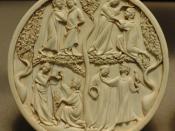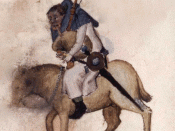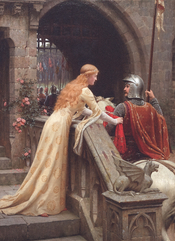A woman is a creature to be treated like an angel of God. She is beautiful, honorable, and chaste. The sanctity of a woman is not only worth fighting for, it is worth dying for. Her glove on plate mail is a harmonious battle cry, a motivation both formidable and divine. Always painfully proper and never morally compromised, she is the embodiment of righteousness. I shall love her from afar, as she will love me back. Never will our love come to physical fruition; it is more holy than that. Her, as well as my, marriage is beneath our love, our love of admiration and complete devotion. She will swoon for me as I shall fight for her, and our spirits are forever intertwined. Physical love and lusty temptation are too worldly for us.
These would be the thoughts of any proper knight toward his lady. "The Miller's Tale" is a satire of courtly love and its actuality in times contemporary the setting of The Canterbury Tales.
The characters Alison, Absalon, and Nicholas are exacerbated examples of the degradation of courtly love that happened in medieval times, a direct result of man's inclination to indulge in earthly pleasure.
Alison does shame to the notion of courtly love. She personifies deceit, infidelity, and moral perversion. Toward the object of what must be her courtly love, as she was married before ever encountering him, she extends promise of physical engagement so far as to the point of sex. She deceives her husband so that she can philander with John, who she should be the object of her worship, not her lust. She is the complete opposite of the morally upright woman she should, and her "courtly" love for John is little more than indulgence in sin. Also, in her...


